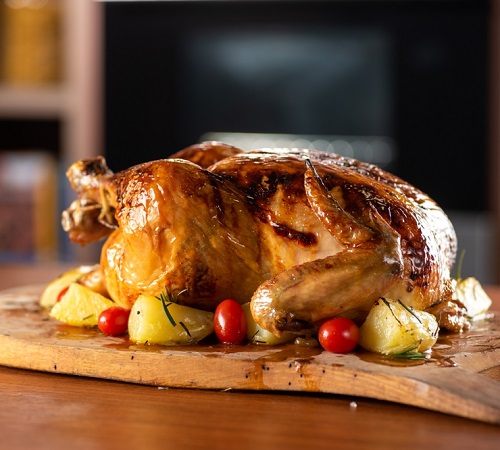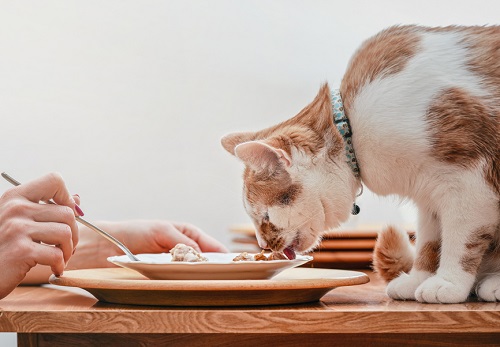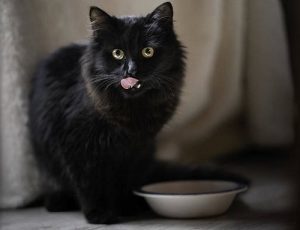Can Cats Eat Rotisserie Chicken? Find out if this popular human food item is safe for felines in our informative article.
Pet owners are often left in two minds about whether or not to share their food with their pets. Today’s question is – Can Cats Eat Rotisserie Chicken? Cats are known for their love of meat, and the smell of cooked chicken can be irresistible to them. However, before you start handing over scraps from your dinner plate, it’s important to consider whether rotisserie chicken is a safe and healthy choice for your feline. Scroll on to find out!
Can Cats Eat Canned Chicken? Find out here
What Is Rotisserie Chicken?

Rotisserie chicken is a type of cooked chicken that is roasted on a spit, rotating slowly over heat to ensure even cooking. It’s a popular option in many grocery stores and restaurants, where it’s often seasoned with herbs and spices for added flavor. Rotisserie chicken is a convenient and delicious choice for many people as it can be eaten hot or cold. Furthermore, rotisserie chicken is often used in a variety of dishes, such as salads, sandwiches, and soups.
Can Cats Eat Rotisserie Chicken?
Can Cats Eat Rotisserie Chicken? The answer is ‘No.’ While chicken is generally considered safe for cats to eat, rotisserie chicken is not the best option, despite its tempting aroma and flavor. This is because rotisserie is packed with seasonings like garlic and onion, which can be harmful to the feline’s overall health.
Does Rotisserie Chicken Contain Any Nutritional Value For Cats?
Chicken, in general, holds nutritional benefits for cats. Vitamins, minerals, proteins, and fats can be found in rotisserie chicken, which is good for the overall growth and development of cats. However, despite the pros, rotisserie chicken is not suitable for felines.
Risks Of Feeding Rotisserie Chicken To Cats

After finding out, Can Cats Eat Rotisserie Chicken? If you still want to feed this chicken to your furball, first read the below risks associated with it.
- Bones: Cooked chicken bones can be dangerous to cats as they can splinter and cause choking or other digestive issues. If not removed properly, the bones can get stuck in a cat’s throat, esophagus, or digestive tract, leading to serious health problems.
- Seasonings: Many rotisserie chickens are seasoned with various herbs and spices, which can be harmful to cats. For example, onions and garlic are common ingredients in many seasoning blends, but they are toxic to cats.
- Additives and preservatives: Rotisserie chicken from grocery stores and restaurants may contain additives and preservatives that can be unhealthy for cats. Some of these additives may cause allergic reactions, gastrointestinal upset, or other health complications in felines.
- Bacterial contamination: Like all cooked meat, a rotisserie chicken can become contaminated with harmful bacteria if not stored or handled properly. This can cause food poisoning and other health problems in kitties.
Options Other Than Rotisserie Chicken
- Cooked, unseasoned chicken: Instead of feeding your cat rotisserie chicken, you can prepare plain cooked chicken at home. Remove the bones, any skin, or fat, and cook the chicken thoroughly before serving it to your furball.
- Canned wet cat food: Wet cat food is a convenient and nutritionally balanced option for felines. Look for high-quality, grain-free varieties that are made with real meat as the first ingredient.
- Raw or freeze-dried cat food: Some pet owners prefer to feed their cats a raw or freeze-dried diet, which can be an excellent alternative to traditional kibble or wet food. Make sure to choose a reputable brand and follow proper food safety guidelines when handling raw meat.
- Cat treats: There are many cat-specific treats on the market that are formulated to meet the nutritional needs of felines. Look for treats that are low in calories and made with high-quality, whole-food ingredients.
Safe Ways Of Feeding Chicken To Cats

- Cook the chicken: Make sure the chicken is well-cooked in order to kill any harmful bacteria or parasites that could cause illness in your cat.
- Remove bones: Cooked bones can splinter and cause choking or digestive issues, so it is important to remove them before feeding chicken to your cat.
- Avoid seasoning: Cats have sensitive stomachs, so it’s best to avoid seasoning the chicken with spices, herbs, onions, or garlic, as they can be harmful to cats.
- Limit the amount: While chicken can be a healthy and nutritious addition to your cat’s diet, it should not make up a significant portion of their meals. Always feed chicken in moderation.
- Use high-quality chicken: Choose high-quality chicken that is free from antibiotics and other harmful additives. Organic or pasture-raised chicken is a good choice.
Note- If you have any concerns about feeding chicken to your cat, always consult with a veterinarian.
Can Cats Eat Rotisserie Chicken? Quick Takeaways!
- Although chicken is safe for cats, a rotisserie chicken contains condiments that can be harmful to the feline gut.
- Rotisserie chicken can hold nutritional benefits for cats but is not suitable for them.
- Risks of feeding rotisserie chicken to cats include cooked chicken bones, seasoning, additives and preservatives, and bacterial contamination.
- Alternatives to rotisserie chicken include unseasoned chicken, canned wet cat food, raw or freeze-dried cat food, and cat-specific treats.
- The safe ways to feed a cat chicken include cooking plain, unseasoned chicken and removing all bones and skin/fat.



